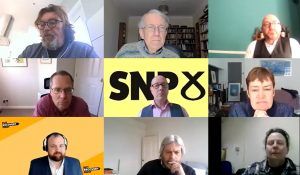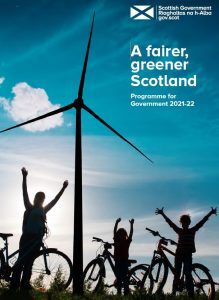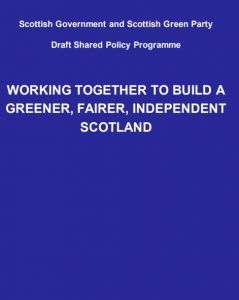As SURF reported last week, the Scottish Government’s 2021-22 Programme for Government features a number of actions and commitments relating to SURF network regeneration policy priorities around place-based collaboration, the climate emergency, land use, and transport.
These four themes formed the core of the 2021 SURF Manifesto for Community Regeneration. We developed the Manifesto developed over a nine month consultation process in 2020, which included semi-structured interviews with cross-sector SURF members across Scotland.

The SURF network debated Manifesto outcomes with politicians in a pre-election digital hustings
The outcomes were presented to the main political parties in advance of the May 2021 Scottish Parliament elections, with a view to influencing the actions and activities of the new Scottish Government. We also debated the recommendations with leading politicians, including the Scottish Government Ministers Patrick Harvie (Minister for Zero Carbon Buildings, Active Travel and Tenants’ Rights) and Kevin Stewart (Minister for Mental Wellbeing and Social Care), at a pre-election SURF hustings debate, from which a video and report is available.
In this follow-up, we revisit the ten ‘bold and practical’ policy recommendations proposed by SURF in our 2021 Manifesto, and explore the extent to which they are reflected in emerging national policy commitments. What follows is an overview of our ten recommendations across the four themes, and any corresponding announcements in the Programme for Government and in the Shared Policy Programme agreed by the Scottish Government and Scottish Green Party as part of their 2021-26 cooperation agreement:
Climate Emergency
SURF Recommendation 1: Take a Wider Approach to Retrofitting
What our Manifesto said:
“Retrofitting is the most widely effective approach to regeneration. Greater investment should be directed towards refurbishment, rebuilding and retrofitting to improve the energy efficiency of older housing and civic buildings, thereby supporting reductions in fuel poverty and carbon emissions, and improvements in health and wellbeing.”
What does the Programme for Government say?:
More action on retrofitting is highlighted prominently in the First Minister’s foreword, and a commitment to invest £1.8bn across the 2021-26 Parliament term on making Scottish homes, “easier and greener to heat”. There is a reiteration of the 2018-32 Climate Change Plan target to “decarbonise 1 million homes by 2030”, and a 2021/22 pledge to:
“…provide increased funding this year for home energy programmes and measures to reduce poor energy efficiency as a driver of fuel poverty, and £30 million for heat and energy efficiency projects in social housing.”
What does the SNP/Green Shared Policy Programme say?
“We also agree… to enable local government and housing associations to provide whole home retrofits where needed, helping to upgrade the most inefficient and expensive to heat social homes to the highest possible standard in one leap.”
SURF Recommendation 2: More Funding for Adaptation
What our Manifesto said:
“The failure of Scotland’s infrastructure to adapt quickly enough to the impacts of climate change, has a disproportionate impact on poorer people and places. Greater public sector project investment is needed to address this, locally, regionally and nationally.”
What does the Programme for Government say?
It states that:
“…in parallel to reducing emissions, we will ensure adaptation to the impacts of climate change which are now a reality.”
There is, however, no detail on additional funding or activity in 2021-22, although “delivering climate mitigation and adaptation” is reported as a key element in legislation planned for 2023, which is associated with the 2020 update to the Climate Change Plan.
What does the SNP/Green Shared Policy Programme say?
It highlights plans for a consultation later in the Parliamentary term to embed climate adaptation mitigation into agriculture and land use support structures. The consultation is to take place ahead of a 2023 plan to introduce a Bill to replace the Common Agricultural Policy framework.
SURF Recommendation 3: Grow Green Jobs for Young People
What our Manifesto said:
“There is an opportunity to jointly resolve two urgent challenges – climate change and COVID-19 impacts on employment prospects for young people – through the creation of a substantial ‘Green New Deal’ style job creation programme.”
What does the Programme for Government say?
There are a range of commitments in this area, including: a £500m investment in “the new, good and green jobs of the future”; a further £500m in a “Just Transition Fund” that will help support workers and businesses in the oil and gas sectors in the North East and Moray to move into green industry; commissioning “pathfinder projects” in the Green Growth Accelerator low carbon infrastructure programme; a Young Person’s Guarantee (“providing a job, a place in education or training, or a formal volunteering opportunity”); and setting up a new “Green Jobs Workforce Academy”.
What does the SNP/Green Shared Policy Programme say?
The creation of “quality green jobs” is stated as a central objective in plans to decarbonise the energy system and increase provision of renewable energy.

The linkages between climate and regeneration feature prominently in SURF’s Manifesto and the Programme for Government
Land Use & Ownership
SURF Recommendation 4: Encourage Long-Term Leasing of Community Assets
What our Manifesto said:
“Persistent problems with capacity, liability and funding around the transfer of land and buildings into community ownership in poorer places could be alleviated by encouraging long-term leasing arrangements, in which public bodies manage asset maintenance and community groups manage usage and activities.”
What does the Programme for Government say?
There is no mention of community asset leasing in the Programme for Government, which highlights additional support for land reform and community buy-outs, including through the doubling of the Scottish Land Fund from £10m to £20m per annum, “to provide support for community ownership projects in urban and rural areas”. A formal review of the Community Empowerment Act – “to consider how local communities can have more of a say over how local public assets are used” – may explore the potential around leasing agreements.
What does the SNP/Green Shared Policy Programme say?
There is no reference to community asset leasing. There is a commitment to review community ownership opportunities and challenges within a:
“…wide-ranging consultation on land reform proposals with a spectrum of stakeholders for inclusion in a Land Reform Bill to be introduced by the end of 2023.”
SURF Recommendation 5: Increase Development on Brownfield Land
What our Manifesto said:
“A determined shift from building new developments on edge-of-town greenfield sites, to brownfield ones, would produce wellbeing, climate and urban connectivity benefits. More land remediation investments, would reduce the higher development costs and the complexities of post-industrial infrastructure and contamination legacies present in brownfield sites.”
What does the Programme for Government say?
There is no specific commitment on brownfield- first development, but “unblocking the reuse of persistent vacant and derelict land” is on the policy agenda, with a commitment to establish a £50m low carbon Vacant & Derelict Land Investment Programme.
What does the SNP/Green Shared Policy Programme say?
The two parties confirmed an agreement to “prioritise bringing vacant and derelict land and property back into productive use” over the Parliamentary term.
SURF Recommendation 6: Prioritise Empty Homes
What our Manifesto said:
“Create more housing by converting vacant buildings in towns and cities, including retail and office premises and domestic homes, and scaling up the work of the Scottish Empty Homes Partnership.”
What does the Programme for Government say?:
The work of the Scottish Empty Homes Partnership is not specifically mentioned. Some action in this area may come emerge through commitments on affordable housing (“We will deliver 110,000 energy efficient, affordable homes by 2032”), vacant and derelict land and buildings, and new investment in town centres (“Through repurposing of land and buildings, the [£325m Place Based Investment Programme] will revitalise town centres”).
What does the SNP/Green Shared Policy Programme say?
“We also agree… to improve the availability of homes by working together to… bring empty homes back into use. Where possible, empty homes will be brought into the social rented sector.”

Physical regeneration of the built environment was among the key policy themes of SURF’s Manifesto
Place-Based Collaboration
SURF Recommendation 7: Create a New Regeneration Strategy
What our Manifesto said:
“The 2011 National Regeneration Strategy needs to be updated. A new strategy should: take account of the COVID-19 lessons; simplify a complex regeneration policy and practice landscape; articulate a sustainable balance of roles, resources responsibilities; and focus on tackling poverty and facilitating longer-term place-based regeneration collaborations for inclusive growth. It should also include formal guidance on how aspirations for more ‘20 minute neighbourhoods’ – communities in which residents can meet most of their essential needs within comfortable walking distance – can be practically implemented in poorer places.”
What does the Programme for Government say?
There is no commitment to update the strategy. A refreshed approach to place-based regeneration is indicated by a new Place Based Investment Programme, which will distribute £325m over the five year Parliamentary term. This Programme will include new support for town centres, in addition to continuation of the Regeneration Capital Grant Fund, and will be supported by a new ‘Our Place’ website with “information, tools and resources” designed to help practitioners improve health, quality of life, and the environment at a local place level.
The 20 minute neighbourhood approach is mentioned several times as a thematic focal point for the current Parliament. Actions on active travel (“We will ensure that 10% of the total transport budget is spent on active travel over the course of this Parliament”), green public transport, town centres, libraries (“ We will provide a £1.25m fund to help libraries stay open, particularly in areas of deprivation”), and vacant and derelict land and buildings, are stated as helping to support the approach. The Programme also clarifies that 20 minute neighbourhoods will be defined, and priorities articulated, in the forthcoming fourth National Planning Framework.
New Bills on Community Wealth Building and Local Democracy, and a review of the Community Empowerment Act, are also likely to contribute to new strategic developments around place-based and community led regeneration.
What does the SNP/Green Shared Policy Programme say?
There is no mention of a new or updated regeneration strategy in this Parliament, but as with the Programme for Government, evolving plans on planning, community empowerment, town centres and other regeneration-related public policy areas are highlighted. The first highlighted commitment in the Planning section states:
“…we will work towards a [fourth National Planning Framework] that will embed the concept of twenty minute neighbourhoods to strengthen community resilience, reduce carbon emissions and reduce the need to travel, by improving local liveability and wellbeing.”
SURF Recommendation 8: Provide Targeted Whole-Place Investments in Deprived Areas
What our Manifesto said:
“The Scottish Government’s Place Principle is widely viewed as valuable and helpful, but practice is generally not aligning with expectations. The Scottish Government should directly fund a suite of exemplar large-scale, long-term Place Principle oriented collaborations, in the country’s most deprived places.”
What does the Programme for Government say?
There is no commitment to establish a programme matching the one in SURF’s Manifesto. The Place Based Investment Programme, the establishment of Regional Economic Partnerships to “encourage strategic collaboration between key economic actors within regions, to make long‑term, place based decisions to enable sustainable, inclusive prosperity”, and continued support for Clyde Gateway in east Glasgow and Rutherglen, among other actions and plans, are designed to support the implementation of the Place Principle across sectors and geographies.
What does the SNP/Green Shared Policy Programme say?
There is no reference to additional national government support for targeted area-based initiatives.

The SNP/Green cooperation agreement sets out agreed 2021-26 commitments on regeneration aspirations.
Transport
SURF Recommendation 9: Invest in Transport Infrastructure in Smaller Towns & Rural Areas
What our Manifesto said:
“Ongoing investment in bus lanes, walking and cycling routes, and park and ride schemes primarily benefit cities. The more varied circumstances and needs of smaller towns and rural regions should not overlooked.”
What does the Programme for Government say?
A Second Strategic Transport Projects Review – “a Scotland‑wide review of the strategic transport network across all transport modes” – is due for publication in late 2021, and may respond to some of the challenges and imbalances raised by the SURF network, along with the fourth National Planning Framework. A number of investments in rural infrastructure – delivered through mechanisms like the £6m annual Rural Tourism Infrastructure Fund, an Islands Programme with £30m investment over five years, and an Islands Infrastructure Fund – may also address particular transport challenges in rural Scotland.
What does the SNP/Green Shared Policy Programme say?
There is a general commitment to:
“…shift away from spending money on new road projects that encourage more people to drive, and instead focus our money and effort on maintaining roads, improving safety and providing a realistic and affordable alternative through investing in public transport and active travel.”
SURF Recommendation 10: Reverse the Decline in Bus Services
What our Manifesto said:
“The decline in bus usage and the negative impacts on more deprived and disconnected places is a serious and increasing concern. The challenges are multi-layered and difficult to resolve, but for important and interconnected economic, social and environmental reasons, the Scottish Government needs to take further action to increase provision and usage.”
What does the Programme for Government say?
There are several actions that are designed to increase bus usage among the Scottish public, including: “legislation for free bus travel for people aged under 22”; a “Fair Fares Review” to address the rising costs of using public transport; “£500m of long term investment in bus priority infrastructure”; and a Community Bus Fund that regional transport authorities can access.
What does the SNP/Green Shared Policy Programme say?
It also draws attention to the Fair Fares Review and Community Bus Fund, and highlights particular commitments towards improving bus prioritisation on roads in North East Scotland, including the A96 corridor between Inverness and Aberdeen.

Influencing national regeneration policy is one of SURF’s core functions
Next Steps
SURF will be promoting our policy priorities and tracking progress on relevant Programme for Government commitments across 2021-22.
You can learn more about our policy influencing activities by:
- Reviewing SURF’s 2021 Manifesto and our recent policy consultation responses;
- signing up for our monthly e-bulletin;
- and by contacting SURF’s Policy Manager, Derek Rankine, at derek@surf-old.local.
